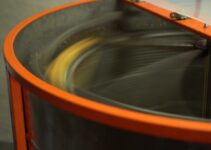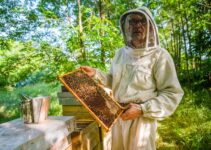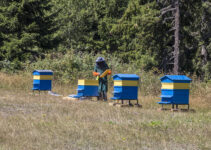Bees and wasps are great for the environment, but it can be a little challenging when their environment becomes your environment! What can you do if you notice bees and wasps making themselves comfortable around your home?
Bees and wasps invade homes in search of food and shelter. The key to keeping these creatures away is to eliminate as many food and shelter options as possible to make your home and pool area less attractive to wasps or bees. This strategy, combined with repellants, will keep them away.
Bees and wasps may look similar at a general glance, but they are very different creatures. They have different food sources and nesting requirements, so they need different strategies to keep them away from your home.
Methods To Keep Bees And Wasps Away From Your House
Bees and wasps can become unwanted summer guests around your home, which can cause some concern, especially if you or your family members are allergic to wasps or bee stings.
These little critters can also put a damper on outside entertaining or enjoying a weekend barbeque with your family.
There is some crossover in the methods for keeping both bees and wasps away from your home, but there are enough differences to warrant treating them separately.
We will elaborate on methods for keeping bees away from your home and follow up with methods for addressing wasps around the home.
Keeping Bees Away From Your Home
Bees are welcome pollinators, and they serve an important function in your garden, but that’s where you want to keep them; in your garden.
Prevention is the best approach since once the bees become established and make a nest in or around your home, you will need professional help to remove them.
1. Plan Your Garden Carefully
Bees are attracted to flowers that provide them with a source of pollen and nectar, which means they will target blossoms that offer them the most benefit.
When you plan your garden, plant flowers that attract bees in areas that are away from your house. Any plants grown close to your home should be leafy green plants or plants that produce flowers that do not interest bees.
Some plants have flowers that are not attractive to bees and include the following.
- Roses
- Marigolds
- Chrysanthemums
- Geraniums
- Foxglove
- Feverfew
- Amaryllis
- Petunias
Planting these flowering plants will give the color you want around your home but will not attract the bees. These flowers either have nothing to offer bees, or their structure is not conducive for bees to access the resources in the flowers.
2. Block Holes Around Your Home
Bees look for dark, warm, protected places to build their nests. An annual inspection around your home to detect any possible access points that could prove attractive to scouting bees will prevent them from choosing your home to build a nest.
Pay particular attention to gaps between wall sidings, where the roof meets the walls, knotholes in wood sidings, and where the walls meet the foundations.
Use wood filler to block homes on wood paneling, or cover them with metal screening, such as hardware cloth, that the bees cannot penetrate.
Calking any gaps and holes is also a good method of keeping the bees out and preventing them from making a nest in hidden places in your home.
3. Keep Your Yard Tidy
Bees make nests in unusual places, from old tires to abandoned appliances such as old washing machines or air conditioners.
Ensure your yard is free of this type of junk, which could attract the bees and provide a potential nesting site for them.
4. Use Vinegar To Repel Bees
If bees often fly in through open windows, you can deter them from flying in by placing a saucer of white vinegar on the window sill at the open window.
The vinegar smell is unpleasant for the bees and will keep them away and make it less likely that they will fly through the open window.
5. Burn Citronella Candles In Your Home
A few strategically placed lit citronella candles near open doors and windows will help deter bees from entering your home.
Most insects do not like the smell of citronella, so it serves as a multipurpose deterrent for keeping bees, flies, and mosquitoes away from your home.
Always practice sensible safety measures when you have open-flame candles around your home, as this can be a fire hazard.
6. Use A Homemade Bee Repellant
A homemade bee repellant is another measure to make your home unattractive to bees. A simple recipe made from ingredients that will not kill or harm the bees or other insects is an ideal way to keep them away.
You will need the following equipment and ingredients to make your homemade bee repellant.
- 1 empty spray bottle
- 3 teaspoons unscented Castile liquid soap
- ¼ teaspoon cinnamon
- ¼ teaspoon cayenne pepper
- 5 drops of peppermint oil
Mix these ingredients in the spray bottle and spray the bee repellant on surfaces around doors and windows to keep the bees away.
Keeping Wasps Away From Your Home
Wasps are not as numerous as bees, even if they have a nest in your yard, but they can be as troublesome as bees when they enter your home.
Keeping wasps from taking an interest in your home is the best measure to keep them away and bothering you in your home.
- Wasp-proof your home. Take the same steps as mentioned with bees to block holes and crevices around your home that could become potential nesting sites for wasps.
- Don’t leave leftovers lying about. Wasps are attracted to sweet food and drink as well as protein such as meat scraps. Wasps are also predatory and will enter your home to hunt other insects attracted by food leftovers. This includes sealing your trash cans to prevent insect access.
- Get rid of other insects and spiders in your home. Wasps eat other insects and particularly like spiders. Removing these food sources from your home will give wasps no reason to invade your home to hunt.
- Don’t plant flowers with nectar near your home. Wasps are also attracted to flowers that offer nectar, especially in the fall, when they need the energy reserves for winter. Plant flowers that do not attract bees or wasps close to your home to prevent attracting these critters.
Taking these simple measures will keep wasps at bay and keep them out of your home.
Keeping Wasps And Bees Away From Your Pool
Keeping bees and wasps out of your home is one thing, but how do you keep them away from your pool area, especially when you want to enjoy some poolside fun or entertain guests in the summer?
The strategy we recommend around your pool area works for bees and wasps. Implement as many of these as you can to eliminate the possibility of bees and wasps invading your pool area.
- Don’t use floral fragrances. This includes deodorants, perfumes, and air fresheners. The floral scents will attract bees and wasps, and they will come to investigate the possible food source.
- Don’t plant flowers that attract bees near the pool. Bee-friendly flowers are also wasp-friendly flowers. Avoid planting these flowers and plants near your pool area.
- Keep all sugary drinks closed. Sugary drinks attract bees and wasps. Keeping a lid on these drinks will limit the attraction value to these creatures.
- Use a bee repellant around the pool. Use a homemade bee repellant around your pool and spray outdoor furniture with the mixture to keep bees and wasps away.
What To Do About A Bee Or Wasp Nest In Your Home
If you have discovered that bees or wasps have already moved into a crevice in your home or under your deck or pool area, what can you do to remove them?
The best and safest option for you and the critters is to call a professional to remove the nest and the bees or wasps. Removal is not the only step that must be taken. The area must be treated to prevent the site from becoming an attractive nesting site for these creatures next season.
In some instances, a wasp nest can be removed as a DIY operation, but it is risky and should not be attempted unless you know what you are doing.
Bees should never be removed yourself. There are tens of thousands of bees in a nest that will become angry if you mess with them. Rather call a beekeeper to safely remove the nest.
Conclusion
Bees and wasps can be a nuisance in the home and around your pool. However, taking a few basic steps will make your home less attractive to these creatures and lower the risk of them entering your home.
The best option to remove a nest is to contact a professional that can safely remove the bees or wasps and secure the area to prevent them from using the site for nesting again.
References
https://www.cleanipedia.com/za/in-the-home/how-to-keep-bees-away-this-summer.html
https://www.wikihow.com/Keep-Bees-Away-from-Your-House
https://www.callmccauley.com/blog/2019/april/pest-control-101-how-to-keep-the-wasps-and-bees-/





